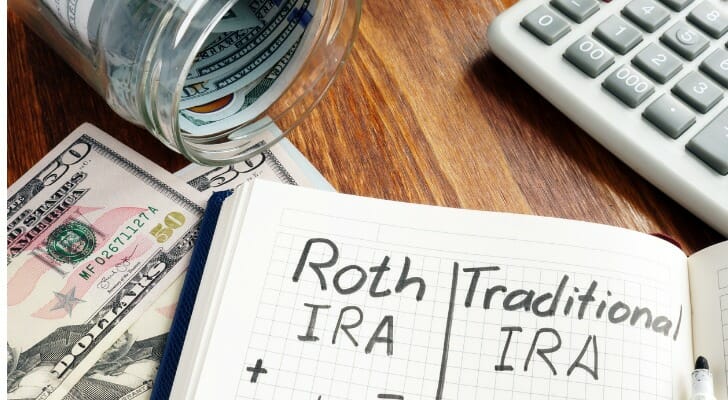Considering opening a Traditional IRA or Roth IRA? These retirement accounts offer significant tax advantages, but they’re not a one-size-fits-all solution. We’ll break down the key IRA benefits and potential drawbacks of each option, helping you make informed decisions about your retirement planning.
If you’d like personalized guidance, consider working with a financial advisor to develop a retirement savings strategy tailored to your unique goals and needs.
What Is an IRA?
An IRA functions similarly to a 401(k) plan, but you don’t need to work for a company that offers one to get it. You can open one at a bank or through most financial institutions. It also provides several tax benefits.
For starters, you can make tax deductible contributions to an IRA. In 2026, you can contribute up to $7,500 toward an IRA. So that means you can reduce your taxable income by as much. And if you’re at least 50 years old, you can make “catch-up” contributions of up to an extra $1,100.
In addition, your investment grows tax free while it’s in the account. So you won’t get taxed on any interest, dividends or any other gains your account earns.
However, you will be taxed once you start making eligible withdrawals. You can do so once you turn 59.5. This isn’t the case with a Roth IRA.
What Is a Roth IRA?
Unlike with traditional IRAs, you invest in a Roth IRA with after-tax dollars. In other words, it doesn’t reduce your taxable income. The trade-off, however, is that you can make tax-free withdrawals once you turn 59 ½ as long as you’ve had the account open for at least five years.
Still, your earnings grow tax free while your money is in the account. And as with IRAs, their Roth counterparts allow you to invest in just about any stocks, bonds, exchange-traded funds (ETFs) and mutual funds you want.
In fact, the investment options for a traditional IRA or Roth IRA tend to be far more vast than the ones available to you through a 401(k) plan.
Who Should Get a Traditional IRA?

Investing in a tax-deferred account such as a traditional IRA makes sense if you expect to find yourself in a lower tax bracket as you approach retirement. That way your withdrawals get taxed at a lower rate than, say, the one you pay now. But if you intend to work or earn more money the closer you get to your golden years, the Roth IRA may be a better option.
Who Should Get a Roth IRA?
You can make eligible withdrawals from a Roth IRA tax-free once you reach age 59 ½. The only other condition is that your account must have been open for at least five years. So you can’t immediately roll over your IRA money into a Roth option and begin enjoying the tax break.
But if you expect to be in a higher tax bracket when you retire, this can prove a beneficial option.
Disadvantages of IRAs and Roth IRAs
Unlike with Roth IRAs, you have to start taking your money out of its tax-sheltered status eventually. In fact, you have to start taking required minimum distributions (RMD) when you turn 73.
RMDs don’t apply to Roth IRAs as long as you’re alive. However, your beneficiaries must take RMDs at some point depending on their relation to you.
Bottom Line

When it comes to retirement planning, the best choice you can make is to start saving right now. And both traditional IRAs and Roth IRA are excellent vehicles to build your retirement nest egg. Both offer tax benefits, but one may be better for you depending on your circumstances. Generally speaking, if you expect to be in a higher tax bracket when you retire, a Roth IRA may be a better option. Still, there’s no rule stating you can’t have both.
Tips on Retirement Planning
- Finding a financial advisor doesn’t have to be hard. SmartAsset’s free tool matches you with vetted financial advisors who serve your area, and you can interview your advisor matches at no cost to decide which one is right for you. If you’re ready to find an advisor who can help you achieve your financial goals, get started now.
- Use SmartAsset’s free retirement calculator to see if you’re on pace to meet your goals.
